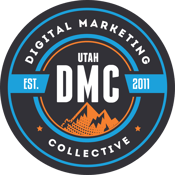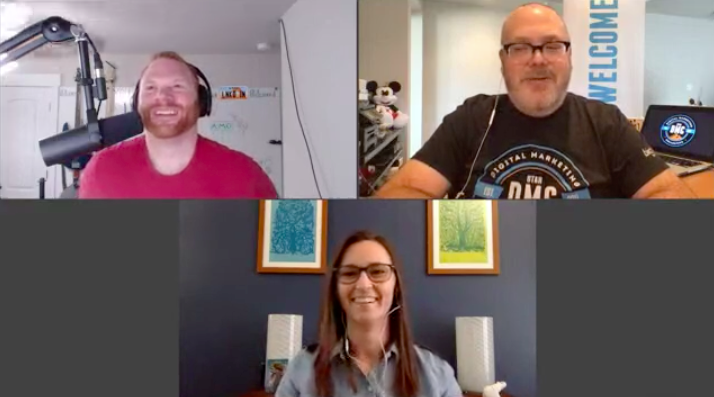This month we had the pleasure of having Michelle Morgan, Director of Client Services for Clix Marketing, speak to all of us at Utah DMC. Another wonderful virtual event for the record books! Not only is Michelle super talented at ads-based marketing but she was also given the number one spot in the Top 25 Most Influential PPC Experts of 2020 from PPC Hero.
The purpose of Michelle’s webinar was to help attendees better understand how to leverage Facebook’s algorithm for better ad performance. This purpose was definitely achieved with all the great tips and tricks that she was able to provide.
Leveraging the Facebook Algorithm for Better Performance
According to Michelle, there are a lot of little tweaks that you can make to get more out of the Facebook algorithm but it can also be very confusing at times. The algorithm is very involved and it’s easy to get lost in the minutiae.
While there are a lot of things that go into it, the biggest impactor is campaign segmentation -- how campaigns are structured.
Michelle compared the performance of ads on Facebook to spacecraft re-entry to Earth’s atmosphere. If we target ads too broadly, we’ll miss the mark. And if we target ads with too much control, we’ll still miss the mark.
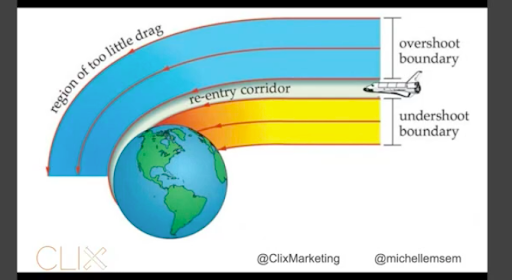
Typically, ad campaigns are so heavily controlled because that’s what works so well in search. The only problem with this mindset is that it doesn’t work as well with Facebook.
As a marketer, you have to find the middle pattern to withstand ‘choking the life-force’ out of the Facebook algorithm.
Michelle says that there are three factors for campaign structure:
- Campaign objectives
- Budget
- Target audience size
Campaign Objectives Optimization
Facebook gives you these three objectives: awareness, consideration and conversion.
In Michelle’s expert opinion, she mentions that conversion campaigns have the most flexibility so you can hit the right metrics that you want. However, be sure that each ad set has an active conversion action as this is what the algorithm will optimize for.
Use standard events from Facebook or Custom Conversions and then go the extra mile to use Google Tag Manager and get specific with custom events setup. You can even go as far as creating a custom Facebook script so that you can tie a value to an action.
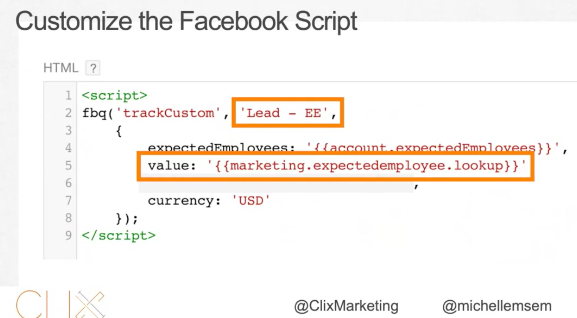
Michelle noted that it’s important to think about the different segmentations of people that convert on your site and the actions that they took so that the conversions can focus on those specific conversions. Anything you can fire a trigger for in GTM is a great option to test for this.
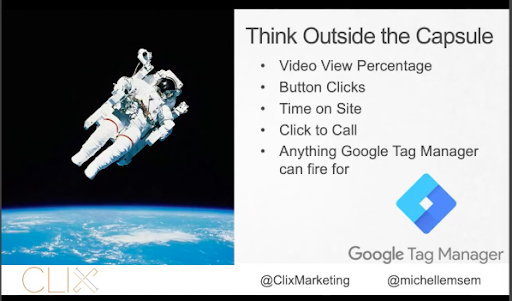
You need to make sure you have the right volume and specificity to get real results. Facebook says that it wants brands to have about 50 conversions in a 7-day click window. This can be hard for some accounts because this is on a per ad-set level.
If you’re E-commerce and your purchases aren’t that high, maybe shift to conversions for “Add to Cart” and see if that works better instead. It’s all about tweaking what you have to work with what you got.
Budgets
Michelle also mentions that consolidating the variety of groups provides a greater ability to get better performance because the ads were in the same space.
She says that “lifetime budgets” seem to be the only way to schedule your ads whereas daily budgets are the only ones she uses -- especially for evergreen campaigns.
Facebook says that it will spend your budget across the ad-set each day that is performing the best; however, the performance has been mixed which is why it’s not forced. If you want to test it out, use CBO (campaign objective optimization). It’s also important to let Facebook learn and find good performance with your budget. You can still get some decent performance with a lower budget if you let Facebook’s algorithm learn as it shows your ads.
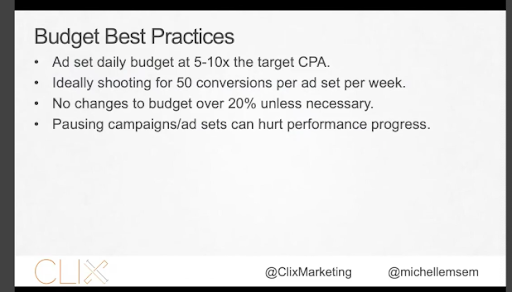
Target Audience Size
As far as a target audience, Facebook will always go after the lowest hanging fruit first and will then go after harder and harder audiences. Each thing that you do will require smaller amounts of audience.
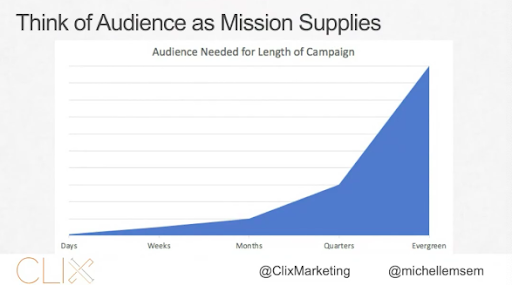
When we narrow our audience, we make it tougher for Facebook. It’s very important to keep track of size and scope using the sidebar as you build audiences.
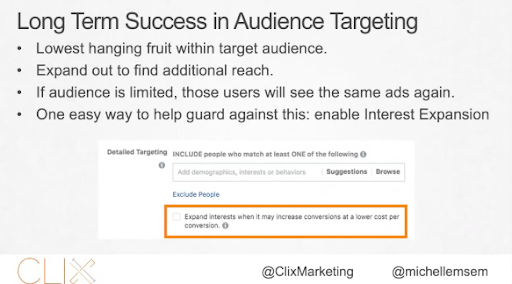
One of Michelle’s favorite targeting options on Facebook is look-alike audiences. This also allows Facebook a good amount of control that seems to pay off. Try to find people that look like your root/base/seed audience without having to use Facebook targeting. When you use Facebook targeting, it’s not as accurate whereas Facebook has better targeting with look-alike audiences. If Facebook has all that data, allow them to use it for your campaign’s benefit!
Set up lookalike audiences from the following:
- Engagement audiences
- Website audiences
- Page audiences
- Custom audience uploads
Remember: the data that you get out of your look-alike audience will only be as good as you put in.
To do this, use meaningful segmentation to get these audiences:
- Thank you page visits
- Pricing page visits
- Video viewers
- Company size
- Returning vs one time
- Service used
- Product category
- Job title
- Industry
- Geography
- Sales vs regular price
Pro Tip from Michelle: Break a 50k audience into 5 separate audiences of 10k users. This way you will have 5 different lookalike audiences to test and then determine which segment works the best to get the most bang for your buck.
One of the last things Michelle talks about is using ads on Instagram Stories. Your Facebook ads can be repurposed for Instagram and they will look fine, but there are options to make them look better (see comparison below).
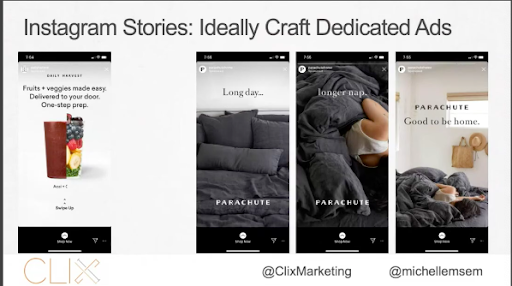
For more information on how to do this and to customize your ads by placement, watch this video tutorial by Michelle.
The key takeaways from Michelle’s presentation were the following:
- Leverage the algorithm in every way
- Focus on the goals you really want
- Keep budgets & target audiences to scale with duration of the campaign
- Ad testing takes a lot of work
- Change your perspective on placements
All in all, it was a super insightful event and jam-packed full of information. You’re going to want to watch this one to ensure you get everything.
If you couldn’t make this event live, you can see the replay below. And be sure to check out and register for all of our upcoming DMC online events (and watch all the past ones too)
Want More Detail? Enjoy The Replay Below!
